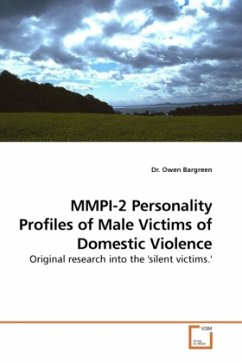
MMPI-2 Profiles of Male Stalkers
An examination of the personality structures of male stalking perpetrators based on their performances on the MMPI-2
Versandkostenfrei!
Versandfertig in 6-10 Tagen
32,99 €
inkl. MwSt.

PAYBACK Punkte
16 °P sammeln!
Stalking is a potentially lethal crime that hassignificantly affected millions. The present studyattempted to explore the dynamics of stalking byevaluating the personality structures of malestalking perpetrators utilizing the MMPI-2. TheMMPI-2 profiles of male stalkers were compared to acontrol group of males from the normal populationmatched on age, ethnicity, and educationalbackground. The differences of the clinical andvalidity scales T score means on the MMPI-2 wereanalyzed using one-way ANOVAs. Based on thestatistical analysis, the male stalkers obtainedhigher scores on Scales Pd, Pa, and...
Stalking is a potentially lethal crime that has
significantly affected millions. The present study
attempted to explore the dynamics of stalking by
evaluating the personality structures of male
stalking perpetrators utilizing the MMPI-2. The
MMPI-2 profiles of male stalkers were compared to a
control group of males from the normal population
matched on age, ethnicity, and educational
background. The differences of the clinical and
validity scales T score means on the MMPI-2 were
analyzed using one-way ANOVAs. Based on the
statistical analysis, the male stalkers obtained
higher scores on Scales Pd, Pa, and F and the
differences in means were statistically significant.
The stalking group s scores on Scales Hs, D, Hy, Pt,
and Sc where also significant at the p.05 level,
while the T scores of the non-stalking group obtained
significance on Scale K at the p.05 level. The
results indicated that male stalkers may experience
more interpersonal distress and, in times
of stress, become more irritated, aggressive and
manipulative than the matched sample.
significantly affected millions. The present study
attempted to explore the dynamics of stalking by
evaluating the personality structures of male
stalking perpetrators utilizing the MMPI-2. The
MMPI-2 profiles of male stalkers were compared to a
control group of males from the normal population
matched on age, ethnicity, and educational
background. The differences of the clinical and
validity scales T score means on the MMPI-2 were
analyzed using one-way ANOVAs. Based on the
statistical analysis, the male stalkers obtained
higher scores on Scales Pd, Pa, and F and the
differences in means were statistically significant.
The stalking group s scores on Scales Hs, D, Hy, Pt,
and Sc where also significant at the p.05 level,
while the T scores of the non-stalking group obtained
significance on Scale K at the p.05 level. The
results indicated that male stalkers may experience
more interpersonal distress and, in times
of stress, become more irritated, aggressive and
manipulative than the matched sample.












